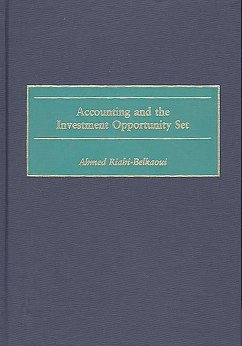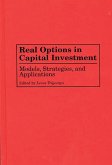A firm's value consists of its assets-in-place and growth opportunities: its investment opportunity set. IOS plays a major role in determining a firm's corporate and accounting strategies, and how the marketplace reacts to them. Riahi-Belkaoui shows how IOS can be examined, measured, and used as one way to understand the various accounting and nonaccounting strategies espoused by management. His book fills a gap in the literature on this timely and provocative topic, and provides useful knowledge for upper management, academics, and graduate-level students. The importance of the IOS concept is beginning to be acknowledged in the literature of empirical accounting, finance, and management. There, the investment opportunity set is introduced as an explanatory or moderating variable of the relationship between accounting and economic phenomena and various predictor variables. Riahi-Belkaoui explicates a concept of growth opportunities or IOS (Chapter 1) and provides a general model for its measurement (Chapter 2). He shows its role in a general valuation model based on dividend yield and price earnings ratio (Chapter 3), in the relationship between profitability and multinationality (Chapter 4), in the determination of capital structure (Chapter 5), in a general model of international production (Chapter 6), in a general model of corporate disclosure (Chapter 7), in the relationship between systematic risk and multinationality (Chapter 8), in a model of reputation building (Chapter 9), and earnings management (Chapter 10). He goes on to discuss its role in explaining the relative market value compared to the accounting value of a multinational firm in Chapter 11, and in differentiating between the usefulness of accrual and cash flow based on valuation models in Chapter 12.









